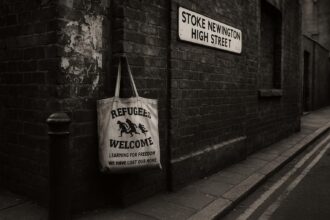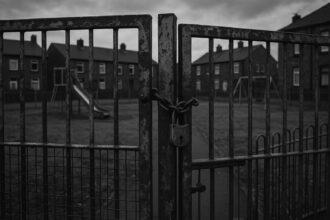Downing Street is exploring the introduction of the BritCard, a digital identity app aimed at tightening border controls and verifying legal rights to work and rent, amid ongoing debates over immigration policy and government oversight.
Downing Street is actively considering the introduction of a digital identity card app, dubbed the BritCard, as part of a broader initiative to curb illegal immigration and its related challenges. This proposed app would allow users to display their right to live, work, and rent in the UK on their smartphones, integrating with existing government databases to streamline verification processes for landlords and employers. High-ranking officials, including cabinet office minister Pat McFadden and technology secretary Peter Kyle, have expressed support for this initiative, which proponents believe could signal that the UK is not an easy target for illegal migrants.
Britain stands out as the only European country without a national identity card system, following the scrapping of a previous plan initiated under Tony Blair in 2011. Advocates for the BritCard assert that it could not only enhance immigration controls but also help combat benefit fraud by establishing a direct connection to government records. The system is designed to operate in conjunction with various services, including NHS accessibility, passports, and driving licences, which would all be managed through this digital platform.
The think tank Labour Together, previously helmed by Sir Keir Starmer’s chief of staff, has detailed plans for the BritCard, which include mandatory ID checks for property rentals and employment. This framework aims to address concerns regarding the forgery of existing identity documents, which can mislead landlords and employers about an individual’s eligibility to work or rent. A recent report emphasises the urgency of making digital identity a government priority, highlighting a poll where 80% of the public supported the concept of digital right-to-work credentials. Notably, approximately one-third of respondents indicated that such a measure could deter illegal immigration.
Despite this momentum, the proposal has not garnered unanimous support within the Labour Party. Home Secretary Yvette Cooper has maintained a more cautious stance amid escalating calls for stricter immigration controls, particularly as record numbers of migrants cross the English Channel in small boats. Recent figures revealed over 1,194 migrants arrived on just one Saturday, marking the highest single-day total this year and contributing to an overall increase of 42% in migrant arrivals compared to the same time last year. Critics, including Conservative leader Kemi Badenoch, have raised concerns about the effectiveness of current immigration policies and the perceived failures of the government to manage borders effectively.
The conversation surrounding the BritCard intersects with ongoing debates about immigration in the UK, especially against the backdrop of rising public discontent regarding the handling of border policies. Sir Keir Starmer has acknowledged public frustrations, asserting that he aims for substantive policy changes rather than superficial solutions. While many proponents of the BritCard see it as a necessary step towards modernising the UK’s approach to identity verification and immigration enforcement, opponents voice concerns about the system’s potential for exclusion and the implications of government oversight.
Historical context adds layers to the debate. The failed attempts to implement a national ID card system in the past involved significant public pushback over privacy concerns and fears of government overrereach, sentiments that still resonate. By contrast, the current proposal is viewed by some as a necessary evolution in governmental services, especially as Britain navigates the complexities of immigration in a post-Brexit landscape.
Overall, as discussions surrounding the BritCard progress, the complexities of implementing such a system will undoubtedly require careful consideration of public sentiment, the nuances of immigration policy, and the urgent need to address the issues that have arisen from illegal migration patterns in recent years.
 Reference Map:
Reference Map:
- Paragraph 1 – [1], [2]
- Paragraph 2 – [1], [4]
- Paragraph 3 – [2], [3], [6]
- Paragraph 4 – [1], [5], [7]
- Paragraph 5 – [4], [6]
Source: Noah Wire Services
- https://www.dailymail.co.uk/news/article-14785911/BritCard-Downing-Street-app-illegal-immigration.html?ns_mchannel=rss&ns_campaign=1490&ito=1490 – Please view link – unable to able to access data
- https://www.ft.com/content/ca28a2ea-1bf0-44c0-b127-56339284e48d – Labour MPs are supporting a proposal by the think-tank Labour Together for a universal digital identity credential, termed the ‘BritCard’, aimed at individuals seeking employment or housing in the UK. This initiative is presented as a tool to enhance immigration enforcement, simplify existing landlord and employer checks, and improve access to public services. The BritCard would be mandatory for all legal residents and workers, using existing data without a centralised database or physical card. Instead, it would be a digital credential downloaded to smartphones and verified via an app. The system could cost up to £400 million to implement, with yearly maintenance of £5-10 million, and begin rollout by 2028 under a ‘test and learn’ phase. While Home Secretary Yvette Cooper remained non-committal about a universal scheme, Labour Together claims public attitudes have shifted since the Blair-era ID proposal, which was scrapped in 2010. The plan promises to streamline government service access, combat benefits fraud, and avoid future immigration scandals like Windrush. However, concerns remain about potential exclusion and fairness for those unable to obtain the ID, necessitating oversight and appeal mechanisms. This digital proposal stands apart from ongoing governmental efforts like the GOV.UK digital wallet.
- https://www.bbc.com/news/uk-politics-23489925 – The UK government has announced a crackdown on illegal immigration, including the use of vans displaying messages urging illegal immigrants to ‘go home or face arrest’. The pilot scheme, which cost just under £10,000, involved vans driving through areas such as Barnet, Hounslow, Barking and Dagenham, Ealing, Brent, and Redbridge. The Home Office stated that the scheme was an alternative to criminal procedures and aimed to encourage voluntary returns. However, the initiative faced criticism from various quarters, including Business Secretary Vince Cable, who described it as ‘stupid and offensive’, and local council leaders who argued it could drive people underground.
- https://www.breitbart.com/europe/2025/04/11/leftist-lawmakers-use-migrant-crisis-to-call-for-blair-style-digital-id-system-in-britain/ – Dozens of Labour Party lawmakers have called on Prime Minister Sir Keir Starmer to revive the Tony Blair scheme of a digital identity system in Britain to, supposedly, clamp down on illegal migration. An open letter from around 40 MPs from the Labour Growth Group, the Red Wall Group, and the Blue Labour group urged the government to create a digital identity system to prevent under-the-table employment for illegal migrants as boat migrant crossings of the English Channel have surged to record highs under the Starmer government. The notion of a national digital identity system has long been a pet project of former Labour prime minister and arch globalist Tony Blair, who has said that digital ID cards could contain personal details like passport and driver’s licence information, tax records, and right to work documents. After first attempting to introduce a digital ID in the wake of the September 11th attacks, Blair has gone on to use various justifications for such a system, including illegal immigration and making it ‘simpler and easier’ to access government services. However, many in Britain, dating back to the World Wars, have opposed such a system over privacy and government overreach concerns, seeing mandatory identity-carrying societies as being a fundamentally foreign, low-trust, and European idea. The last Labour government’s attempts to implement a digital ID system were ultimately scrapped at the last moment in 2010 after the election of the Conservative/Liberal Democrat coalition government. The campaign against national ID cards included then-Mayor of London Boris Johnson, who famously said that he would grind it up and ‘eat’ it with his cornflakes. However, such libertarian impulses from the Conservatives were ultimately abandoned during the Chinese Coronavirus crisis, when figures such as Mr Johnson sided with the likes of Blair to push for the adoption of vaccine passports, which many warned would have been a stepping stone towards a national ID system.
- https://www.livemint.com/news/world/uks-trump-style-crackdown-on-illegal-workers-targets-indian-restaurants-stores-11739266428320.html – Restaurants, nail bars, convenience stores, and car washes were among the targets of what the Home Office on Monday, February 10, described as a ‘UK-wide blitz’ on illegal working in the country. The Home Office said 828 premises were raided in January, a 48 per cent increase compared to the previous year. A total of 609 people were arrested, marking a 73 per cent rise from the same period a year ago. British authorities raided businesses that employed unauthorised workers and deported thousands of migrants with no right to stay in the UK. A raid at an Indian restaurant in Humberside, northern England, led to the arrest of seven people and four detentions. What’s billed as a ‘blitz on illegal working’ is part of a pledge by the center-left Labour government to reduce immigration—a priority for many voters—and stop the growing popularity of the hard-right party Reform UK.
- https://www.expressnews.com/news/world/article/uk-touts-a-clampdown-on-illegal-working-as-it-20158091.php – The British government on Monday touted its success in raiding businesses that employ unauthorized workers and deporting thousands of migrants with no right to stay in the U.K. What’s billed as a ‘blitz on illegal working’ is part of a pledge by the center-left Labour government to reduce immigration—a priority for many voters—and stop the growing popularity of the hard-right party Reform UK. But for migrants groups, and some Labour Party members, the images uncomfortably recall a previous Conservative government’s pledge to make Britain a ‘hostile environment’ for illegal migration. That led to thousands of long-term legal residents being denied housing, jobs or medical treatment because they could not prove their status.
- https://apnews.com/article/uk-reducing-immigration-new-rules-f617a8ab03f1bd9ad070a75677aacc43 – Britain’s Home Secretary James Cleverly announced tough new immigration rules aimed at reducing the number of people able to move to the U.K. each year by hundreds of thousands. Under the new rules, immigrants will have to earn more to get a work visa and will find it harder to bring family members to the U.K. From the spring of 2024, prospective immigrants will have to earn £38,700 to get a skilled worker visa, up from £26,200. Revised figures released last month by the Office for National Statistics said net migration to the U.K. was a record 745,000 in 2022. Reducing immigration is a totemic issue for many in the governing Conservative Party, who backed Britain’s exit from the European Union in order to ‘take back control’ of the country’s borders. Britain left the bloc in 2020, ending the automatic right of citizens from the 27 EU nations to live and work in the U.K. Since then, the number of visas issued for people to come to Britain for work or study has soared. The country has also taken in hundreds of thousands of people fleeing war in Ukraine and the Chinese government’s crackdown on civil liberties in Hong Kong. The 2022 immigration figure is three times the pre-Brexit level. The Conservatives believe cutting immigration will shore up votes ahead of an election next year, because many voters see immigrants as adding to pressure on already overstretched public services and worsening a housing crisis. But many economists say immigrants are needed to fill essential jobs – especially in health care and in low-paid social care roles – and that they contribute more to the economy than they receive. Christina McAnea, general-secretary of the Unison trade union, said the measures would be a ‘total disaster’ for health and the care sector. ‘Migrant workers were encouraged to come here because both sectors are critically short of staff. Hospitals and care homes simply couldn’t function without them,’ she said. ‘Migrants will now head to more welcoming countries, rather than be forced to live without their families.’ Opposition Labour Party immigration spokeswoman Yvette Cooper said the government had failed to train U.K. workers to fill key jobs. ‘Where is the workforce plan on social care, on engineering, on bricklaying, on all shortage occupations that their total economic failure has left us with?’ she said.













